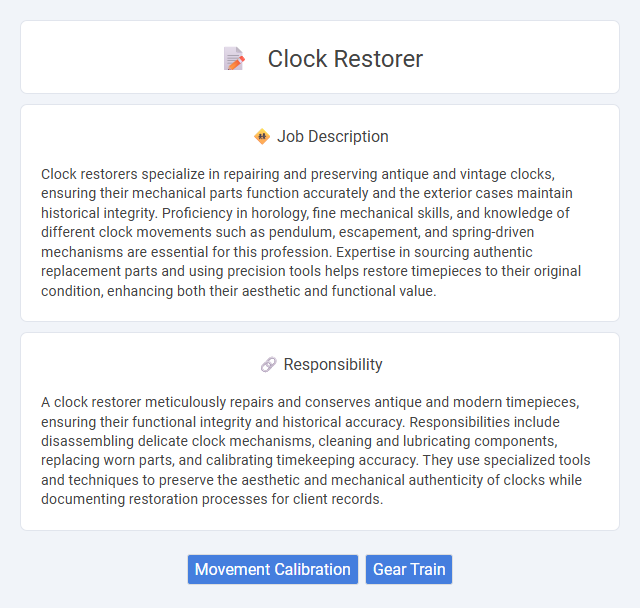
Clock restorers specialize in repairing and preserving antique and vintage clocks, ensuring their mechanical parts function accurately and the exterior cases maintain historical integrity. Proficiency in horology, fine mechanical skills, and knowledge of different clock movements such as pendulum, escapement, and spring-driven mechanisms are essential for this profession. Expertise in sourcing authentic replacement parts and using precision tools helps restore timepieces to their original condition, enhancing both their aesthetic and functional value.
Individuals with strong attention to detail and patience are likely suitable for a clock restorer job, given the intricate and delicate nature of clock mechanisms. People who may struggle with fine motor skills or become easily frustrated might find this occupation challenging. It is probable that those who enjoy hands-on work and problem-solving will find this role fulfilling.
Qualification
Clock restorers require a strong understanding of horology, mechanical repair, and fine craftsmanship to accurately disassemble, clean, and reassemble timepieces. Formal training or certification in clock repair, such as courses offered by horological institutions, enhances skill proficiency and precision. Expertise in working with delicate gears, springs, and historic clock mechanisms ensures successful restoration while preserving the clock's original value and functionality.
Responsibility
A clock restorer meticulously repairs and conserves antique and modern timepieces, ensuring their functional integrity and historical accuracy. Responsibilities include disassembling delicate clock mechanisms, cleaning and lubricating components, replacing worn parts, and calibrating timekeeping accuracy. They use specialized tools and techniques to preserve the aesthetic and mechanical authenticity of clocks while documenting restoration processes for client records.
Benefit
Clock restorers likely benefit from preserving historical artifacts while enhancing their mechanical function and aesthetic appeal. This role probably offers a unique blend of craftsmanship and technical skill, which can result in personal satisfaction and potential financial gain. Opportunities for specialization and working with diverse timepieces may increase job enrichment and professional growth.
Challenge
Clock restorers probably face the challenge of working with intricate mechanical parts requiring precision and expert knowledge of horology. They likely deal with delicate and antique components that demand careful handling to preserve historical value. The job may also involve diagnosing obscure issues that are not immediately visible, requiring patience and problem-solving skills.
Career Advancement
Clock restorers specialize in repairing and preserving antique timepieces, mastering skills in horology and mechanical engineering to ensure accurate timekeeping and historical authenticity. Career advancement opportunities include progressing to senior restorer roles, overseeing restoration projects, or transitioning into museum curation and horological conservation. Developing expertise in advanced restoration techniques and historical research enhances prospects for leadership positions and consultancy within the clock restoration industry.
Key Terms
Movement Calibration
Movement calibration in clock restoration requires precise adjustments to gears, escapements, and balance wheels to ensure accurate timekeeping. Expert restorers analyze mechanical components under magnification, correcting timing errors caused by wear or misalignment. Mastery in movement calibration enhances the longevity and reliability of antique and modern clocks alike.
Gear Train
Clock restorers specialize in repairing and preserving the intricate gear train, a critical assembly responsible for transmitting motion and regulating timekeeping accuracy. Precise cleaning, alignment, and lubrication of gears ensure smooth operation and prevent wear that can compromise the clock's functionality. Mastery of gear train mechanics allows restorers to revive antique and mechanical clocks, maintaining their historical and functional integrity.
 kuljobs.com
kuljobs.com